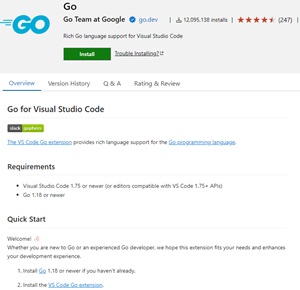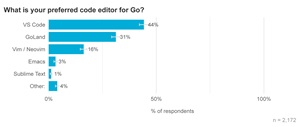News
It's a 'Go' for Microsoft Azure Developers
Microsoft embraces many programming languages beyond its own C#, TypeScript, F# and so on, lately boosting its support for Go, the popular language developed by Google.
The company last week started up the language's very own blog series, aptly titled Microsoft for Go Developers Blog.
The sole post there serves as a welcome and self-announcement: "Our goal with this blog is to inform users and customers of what we are doing to ensure that Go is well supported on Azure. We envision this platform as a space for meaningful discussions, learning opportunities, and sharing best practices for Go Developers deploying to Azure."
The Azure reference is no coincidence as Microsoft's support of other languages can hinge on the cloud where it places most of its development emphasis, and Go is prevalent in cloud computing. In fact, the site for the open source offering sometimes referred to as Golang says, "With a strong ecosystem of tools and APIs on major cloud providers, it is easier than ever to build services with Go."
Python and Java are two other languages that have been embraced by Microsoft in the Azure cloud.
 [Click on image for larger view.] Go Extension (source: Google).
[Click on image for larger view.] Go Extension (source: Google).
Like Java and Python, functionality for Go developers doing Azure development is provided in Visual Studio Code with an extension supported by Go creator Google, who in 2020 took over development of the tool from Microsoft. Last year, a survey indicated VS Code was the No. 1 code editor among Go developers. The tool has been installed more than 12 million times.
 [Click on image for larger view.] No. 1 Editor for Go Devs (source: Go Team at Google).
[Click on image for larger view.] No. 1 Editor for Go Devs (source: Go Team at Google).
Microsoft said it's goal is to foster collaboration and innovation and contribute to the Go ecosystem, promising to share all patches it creates.
Microsoft years ago famously embraced open source after long being criticized as a closed, proprietary, dev monolith, and it referenced that: "One of the key principles guiding our approach to Go development at Microsoft is our commitment to open collaboration and contribution. We believe in the power of the open-source community and recognize the importance of giving back. That's why we're proud to follow our 'upstream everything' philosophy within the team. Microsoft intends to upstream all patches -- subject to them being accepted upstream of course!"
The company will seek to make Go applications more compatible with the Windows APIs and services with specific efforts to support debugging, profiling, troubleshooting and monitoring functionalities, all part of an effort to ensure seamless integration with the Windows environment. It also plans some crypto work.
While the blog series reflects Microsoft's commitment to the Go ecosystem, the company's embrace of its arch-rival's programming language is years in the making (see the 2018 article, "
Microsoft Embraces Go Programming Language for Azure Cloud Development").
More information can be found in Azure for Go developers documentation and Go in Visual Studio Code.
About the Author
David Ramel is an editor and writer at Converge 360.